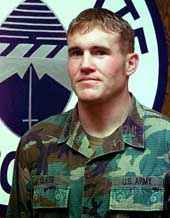Slade to lead ROTC into Ranger Challenge
Every successful team has a leader.
Someone who sets the tone for intensity, guides the group in the right direction and makes the goals for the group known at all times is needed as a leader.
For Utah State University’s Army ROTC ranger team, Brian Slade is that leader. Slade is the team captain for the group which will travel to California next month to compete against 23 schools in the Ranger Challenge.
The journey that brought Slade to USU has been a long and arduous one, which due to changes in the ROTC program, almost didn’t happen.
“I enlisted in 1996 with an ROTC scholarship,” Slade said. “At USU they took the scholarship away while I was at boot camp.”
Slade had the financial funding rug swept away from under him, but chose to wait out the dilemma.
“I went on a mission, came back up to USU, went to school for one year and the ROTC came back,” he said. “I think I was the first one signed up.”
Slade came to USU with an interest in agri-business, but eventually changed his mind.
“I liked the area, so I stayed here,” said the Mountain Home, Idaho native.
Previously, Slade attended one semester at Boise State University.
Enrolled at USU, with his ROTC scholarship and a double major in economics and finance, Slade began climbing up the ROTC ladder. The trek to becoming captain of the ranger team started in the summer.
“We do a camp every summer, and they rate you from one to whatever,” he said.
Slade was successful in the camp and was given a choice of assignments, one of which was captain of the Ranger Challenge team.
“I figured since I’m going to be doing this [the Ranger Challenge] anyway, I would just go with it,” he said.
With the responsibility of being team captain, Slade took over tasks such as coordinating team training and funding. “There are six events that we compete in, and each of them is pretty specific,” he said. “In order to be competitive in any one of those events, it takes a lot of training and repetition.”
The six events the team will compete in are basic rifle marksmanship, land navigation, one-rope bridge, 10K ruck march, obstacle course and physical fitness test.
Slade said he believes the team will be more than just competitive at the
challenge.
“I think that our team, if we perform at the level we are, can take first place in the rope bridge, the ruck march, and maybe the physical fitness test,” he said.
Slade pointed to results of practice runs the team had as evidence that the team will place well in California.
“Wednesday, we did a rope bridge in one minute, 30 seconds, last year the team that won it was a 1:35 average,” he said.
Slade said the ruck march has also been a strong point for his team.
“Nobody has ever done the ruck march in under an hour,” he said. “We’ve done it under an hour, but only with five people and we have to do it with nine.”
The ruck march entails carrying a large amount of gear over 10 kilometers, Slade said.
“It’s actually not a march because we end up running it,” he said. “I enjoy the ruck march, I didn’t used to, but it’s a test of willpower.”
With the team competing well in practice runs, the expectations are high.
“We want to take first, we’re going to show people who we are and take it,” Slade said. “We’re just going to take it, that’s the plan.”
If the team wins, it will carry home a great deal of prestige as well as a 250-pound bear trophy, Slade said.
Adversity will be working against this team at the competition.
“This is a first-year team. Nobody thinks a first-year team can come in and win,” he said.
After the competition, Slade said he hopes to graduate in December and continue in the service flying helicopters. He believes his experience at USU will greatly help his work in the Army.
“I think any institution teaches you how to work with systems, and that’s what the military is highly involved with,” he said. “Extrapolating that knowledge from what I’ve done here at Utah State will help me a lot in the Army.”
-str@cc.usu.edu

